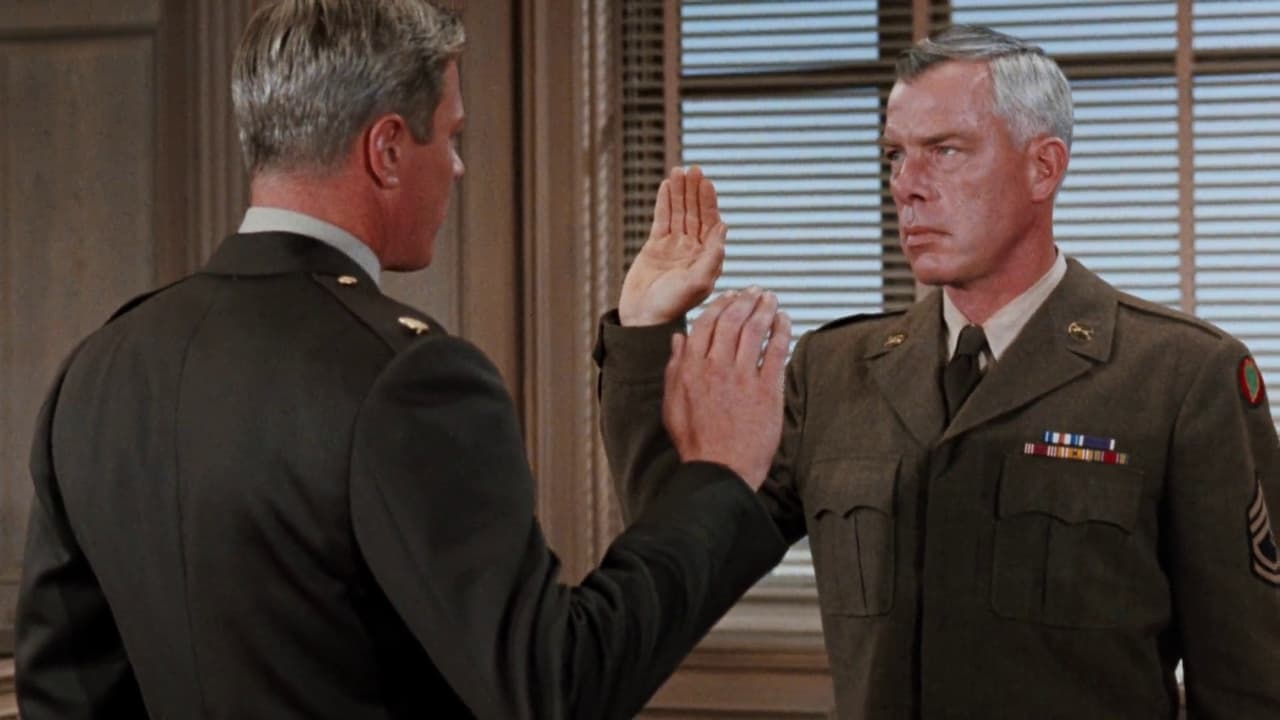




After playing with our expectations, this turns out to be a very different sort of film.
View MoreTrue to its essence, the characters remain on the same line and manage to entertain the viewer, each highlighting their own distinctive qualities or touches.
View MoreStory: It's very simple but honestly that is fine.
By the time the dramatic fireworks start popping off, each one feels earned.
View MoreWhatever this movie's origins, it has Lee Marvin. What an actor. He brings something unexpected to every role, almost to every scene.Here he is in a military prison in Korea. He's just been condemned to death as a traitor. His wife, Vera Miles, has flown six thousand miles to visit him in his cell. He loves her desperately. And how does he show it? He walks up to her, puts his nose against hers for a moment or two, and then quickly ENGULFS her in these long enwinding arms. A brief declaration of need, and he spins away from her abruptly and gets back to his case. The whole scene takes about one minute, and Marvin shows he can do a toe dance around anyone else in the film if the material allowed him to. In boot camp we were shown a training film illustrating the mechanics of courts martial. Lee Marvin, before he was famous, played a sailor who lies on the stand. He nailed the shifty tell perfectly.Not that the other performers are slouchers. They're all seasoned professionals. Vera Miles is pretty and her questions carry an English inflection. The terminal contours drop instead of rising in pitch. I don't mean that to seem complicated. If you hear her ask a question you'll know what I'm getting at. She's very appealing. Peter Graves is tall and sonorous. Murray Hamilton is always a treat, even when he's shallow and leering, as he is here. He's given one of the better lines, roughly: "Imagine how Don Quixote would have felt if the windmills tilted back." Much of the movie depends on Bradford Dillman who gives the role everything he has, but he doesn't bring much to the party. I don't know why. His lines here sound as if they're being recited in an acting class, but he was chillingly good as the homosexual child murderer in "Compulsion". The dependable and always likable Lloyd Nolan is the commanding general.Despite the difference in their ages, both Nolan and Dillman were born in San Francisco, attended prep schools, and went to exclusive universities -- Stanford and Yale respectively. (I wonder if they ever discussed the city; might they both have had dinner at Jack's Restaurant, as Sam Spade did?) Dillman and Marvin were both in the Marine Corps; Dillman narrowly missed the Korean war and Marvin had part of his buttocks shot off in the Pacific. I wish someone would stop me from carrying on with these irrelevancies.The script, lamentably, doesn't match the cast. It's hurried and confused. Fifteen minutes into the movie and Marvin is given an angry speech about (somehow) being set up by a dead officer or something. It's reaches the audience as gibberish because there has been no forewarning. We don't know what he's talking about. A guess is that the editing is so screwed up because this was cobbled together from a two-part TV movie. What's left certainly looks like a TV movie. There are few sets, the lighting is flat, and the dialog could have come from "The Twilight Zone" or "Combat" or "Gunsmoke." The musical score also smacks of TV.Buzz Kulik is an efficient and uninspired director. He was my director on the art house classic, "Too Young the Hero." Despite his inadequacies I managed to give a compelling performance as a drunken hobo, the result of long practice. In this film he allows or encourages almost everyone to overact. "How DARE you bring your ASSUMPTIONS into my COURTROOM!" Something like that.The plot is full of holes, some no doubt due to clumsy editing, but the fact is that the climax lacks logic. Dillman exposes a security leak that has nothing to do with the case against Marvin -- and it gets Marvin off. Problems should always be solved for the rest of us as easily as they are for Lee Marvin in this turbid drama.
View MoreSuperior courtroom drama set near the end of the Korean War. An Army sergeant named Ryker (Marvin) is sent by his commanding officer behind enemy lines, posing as a defector. The sergeant is eventually captured by Allied forces and jailed as a traitor. He is to be executed. His one possible alibi, that commanding officer, is now dead. A captain (Dillman) is convinced of Ryker's story, and convinces a general (Nolan) to let the Army retry Ryker, with the captain serving as his defense attorney. Great cast, including Peter Graves as a major itching to see Ryker hanged, and Murray Hamilton as a cynical officer who is convinced nothing can save Ryker. The courtroom scenes are suspenseful, and this two-part Kraft Suspense Theatre show was wisely turned into a theatrical release several years later.
View MoreAfter Lee Marvin won his Oscar for Cat Ballou and had great critical and popular success also with Ship of Fools and The Dirty Dozen, this former two part television episode from the Kraft Suspense Theater was edited together for release as a feature film. Sergeant Ryker casts Lee Marvin in the role of a soldier who was convicted of treason during the Korean War and sentenced to hang.Sergeant Ryker could have been a whole lot better though. It has the look and feel of a made for television film, but more important than that, the editing probably left a lot out.We come into the story with Bradford Dillman who has just successfully prosecuted Marvin now having doubts about what he did. The military more than most organizations does not like to admit mistakes and Dillman's doubts are raising all kinds of problems for him and for the United States Army.Dillman has other problems as well, he's falling for Marvin's wife Vera Miles and she him. Still he persists in the quest and does get Marvin a new trial, courtesy of General Lloyd Nolan.Marvin says he was given a confidential assignment to defect and gather intelligence. Problem is that the officer who allegedly gave him that assignment was killed and no record of it was found.The trial takes an interesting turn and Dillman does a skillful job for his client. Yet the end of the movie will leave the viewer with a lot of unanswered questions.Look also for good performances from Norman Fell as the sergeant who gives Dillman some key evidence, Murray Hamilton as Dillman's good drinking buddy and prosecutor Peter Graves.
View MoreThe release of "Seargant Ryker" on tape was beautifully timed to take advantage of Lee Marvin's 'discovery' after 25 years of character acting. There was a brief shining moment when he won an Oscar, top billing and much better parts. However, this movie is a cobbled-together version of a two-part television drama. This drama originally served as the pilot for the series "Court Martial" which predated "JAG" by a few years. (When 'Court Martial hit the air, it was moved to WWII England, as opposed to the Korean War locale of "Ryker.") A few combat sequences were tacked on to "Ryker" make it look like an action film, which it isn't. It's a talky courtroom drama - but some of the talk is first-rate, as is BradfordDillman's performance as the reluctant defender. He's the one that's on screen most of the time, holding the plot together with the strength of baling wire. Vera Miles was always a competent actress, but never a star; she exuded a likable prettiness. If I sound mild about Miles, it's because she never moved me much. Dillman, on the other hand, did - he labored under a terrible handicap in the movies:he couldn't hide the fact that he had been to school, knew which fork to use, and was obviously bright. He was a better-than-good actor (see the underrated "Circle of Deception") and is definitely worth watching here.
View More